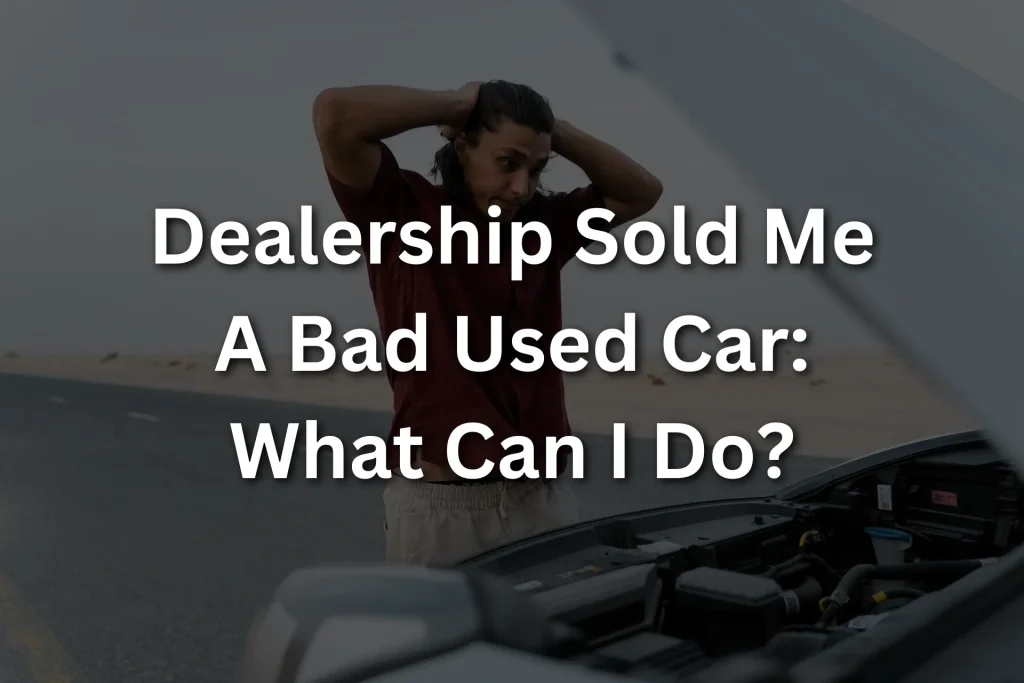
When you drive off the lot with a newly purchased car, the last thing you expect is for it to break down or show serious problems. Yet many consumers find themselves in this exact situation after a car dealer sells them a defective vehicle. If you’re wondering “a dealership sold me a bad car, what can I do?” – you have rights under California law to protect yourself and recover damages. The impact of purchasing a defective vehicle extends beyond just mechanical issues – it can affect your daily life, work commitments, and financial stability.
Understanding Your Rights When Car Dealers Sell Defective Vehicles
California law provides strong protections for consumers who purchase vehicles from dealerships. When a dealer sells you a car with significant defects, you have several legal options available. The specific laws that protect you depend on whether you bought a new or used car, and what kind of warranty came with your purchase.
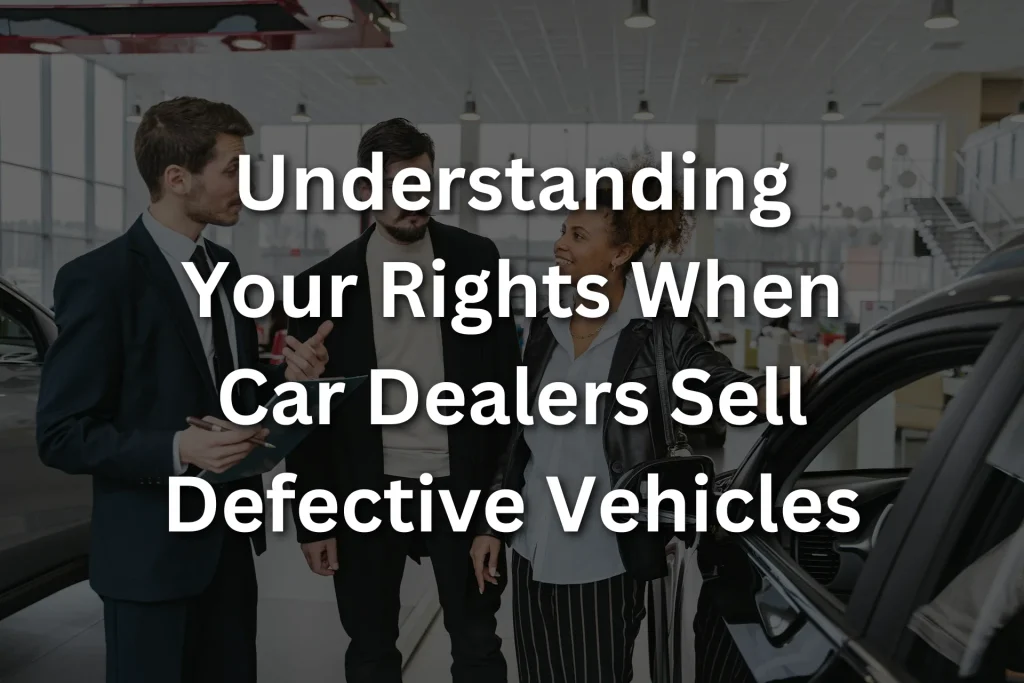
Many consumers don’t realize that even used cars come with certain implied warranties under state law. These implied warranties mean the vehicle must be “merchantable” – in other words, it should work as any reasonable person would expect it to work. The dealer’s obligations don’t end at the point of sale. They must honor both written warranties and these implied warranties, ensuring the vehicle meets basic standards of quality and performance.
Dealerships also have a legal duty to disclose known defects and provide accurate information about the vehicle’s history. When they fail to meet these obligations, they can be held legally responsible for the damages their customers suffer. This includes not just the cost of repairs, but also related expenses and inconveniences caused by the defective vehicle.
Can a Used Car Be a Lemon? Understanding Your Protection
While many people think the lemon law only applies to new vehicles, California’s lemon law can actually protect used car buyers too. This protection is particularly important given the prevalence of used car sales in today’s market. For a used car to qualify as a lemon, it must meet certain criteria under state law.
To qualify for lemon law protection, your situation must meet these requirements:
- The vehicle must still be under the manufacturer’s warranty when the problems begin
- The defects must substantially impair the vehicle’s use, value, or safety
- You must have given the dealership a reasonable opportunity to repair the issue
The law considers a “reasonable opportunity” for repairs to be:
- At least two repair attempts for serious safety defects
- At least four repair attempts for other substantial problems
- OR the vehicle has been in the shop for repairs for 30 days or more total
Examples of qualifying defects include:
- Transmission failures
- Engine problems
- Electrical system malfunctions
- Safety-related issues like faulty brakes or airbags
- Persistent check engine light issues that affect performance
- Steering or suspension problems
The law recognizes that used cars may have some wear and imperfections, but this doesn’t mean dealers can sell vehicles with serious defects. Even with used car sales, dealers must meet certain standards of quality and truthfulness in their representations about the vehicle.
What Legal Options Do You Have Against Car Dealerships?
When a dealer knowingly sold you a defective vehicle, you have several potential legal claims available. Each type of claim has its own requirements and potential remedies, and in some cases, you may be able to pursue multiple claims simultaneously.
Lemon Law Claims
If your vehicle qualifies under California’s lemon law, you may be entitled to a refund or replacement vehicle. The manufacturer must also cover attorney fees if you win your case. This is particularly important because it means you can pursue your rights without worrying about legal costs. The law is designed to hold manufacturers accountable while protecting consumers’ financial interests.
Fraud Claims
If the dealership made misrepresentations about the vehicle’s condition or history, you may have a fraud claim. This can lead to both compensatory and punitive damages against the dealer. Fraud claims often arise when dealers conceal known defects, misrepresent accident history, or make false statements about the vehicle’s maintenance history or condition.
Warranty Claims
Violations of either written warranty or implied warranties can form the basis of a legal claim against both the dealer and manufacturer. These claims can help you recover the costs of repairs, diminished value of the vehicle, and other related damages. Warranty claims are particularly important because they can apply even in situations where lemon law might not.
Critical Steps to Take After Buying a Bad Car
If you suspect your recently purchased vehicle has serious defects, taking these steps can help protect your rights and strengthen your legal position.
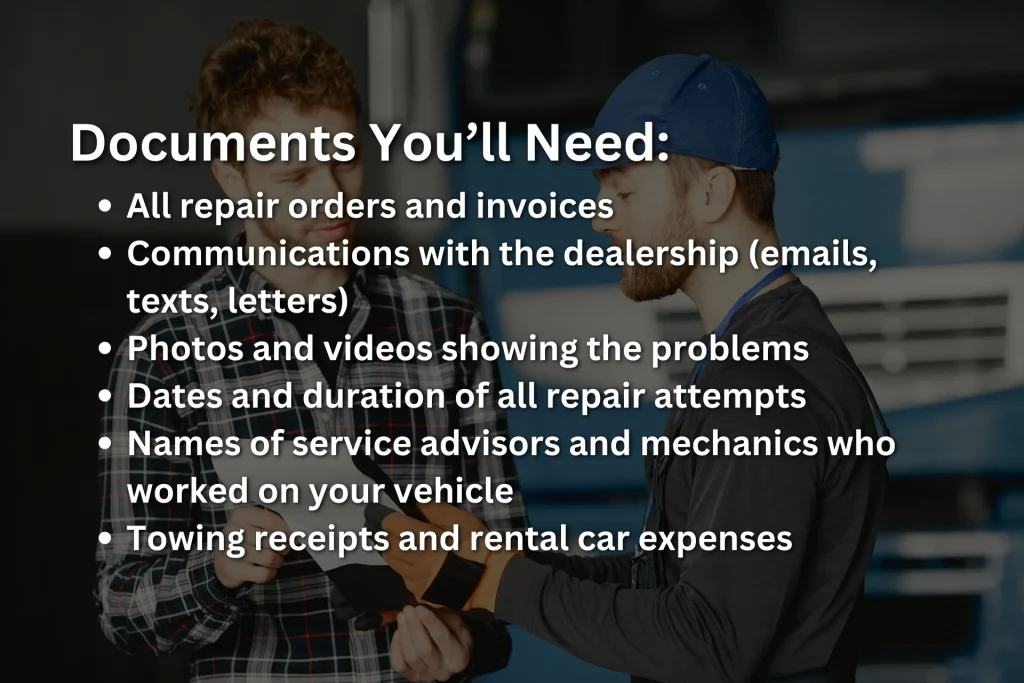
Document Everything
You’ll need to maintain detailed records including:
- All repair orders and invoices
- Communications with the dealership (emails, texts, letters)
- Photos and videos showing the problems
- Dates and duration of all repair attempts
- Names of service advisors and mechanics who worked on your vehicle
- Towing receipts and rental car expenses
Maintain Service Records
Following the manufacturer’s recommended service schedule remains important, even if you’re having problems. Keep records of:
- Regular oil changes
- Scheduled maintenance
- Tire rotations and alignments
- Fluid level checks and replacements
- Any other recommended service items
Get Independent Inspections
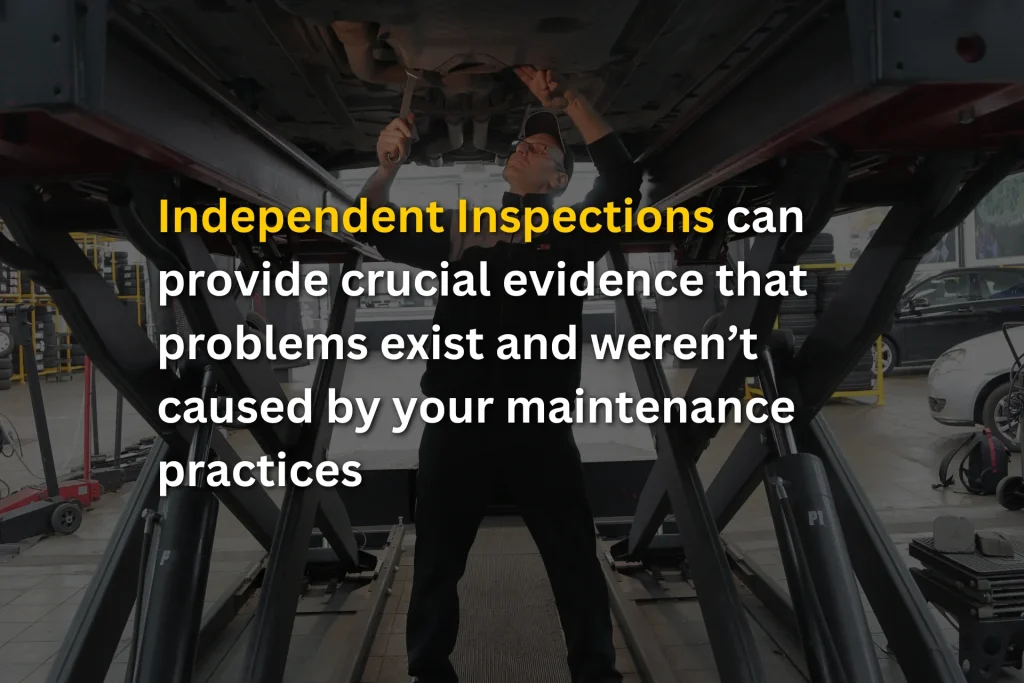
Having an independent mechanic document the vehicle defects provides crucial evidence that problems exist and weren’t caused by your maintenance practices. These third-party evaluations can carry significant weight in legal proceedings. Choose a certified mechanic with experience in your vehicle’s make and model, and request detailed written reports of their findings.
How Vehicle Defects Impact Your Legal Claims
Not all vehicle problems qualify for legal action. Courts look at several factors when evaluating claims about defective vehicles, and understanding these factors can help you assess the strength of your case.
Severity of Defects
Minor issues like a squeaky brake or loose handle usually won’t support a claim. The defects need to significantly impact the vehicle’s safety, value, or usability. Courts consider how the defects affect the vehicle’s primary purpose and whether they pose any safety risks. Serious mechanical problems, safety issues, or repeated failures of major systems typically strengthen your case.
Timing of Problems
When the problems began matters greatly. Issues that appear immediately after purchase strengthen your case, while problems that develop much later may be harder to link to the sale. Document when each problem first occurred and any patterns in how the issues develop or worsen over time.
Repair Attempts
Courts expect you to give the dealer a reasonable chance to fix problems before pursuing legal action. Document every repair attempt and what was done. Keep track of how long repairs take, whether problems recur after repairs, and any new issues that develop during repair attempts.
Understanding Damages You Can Recover
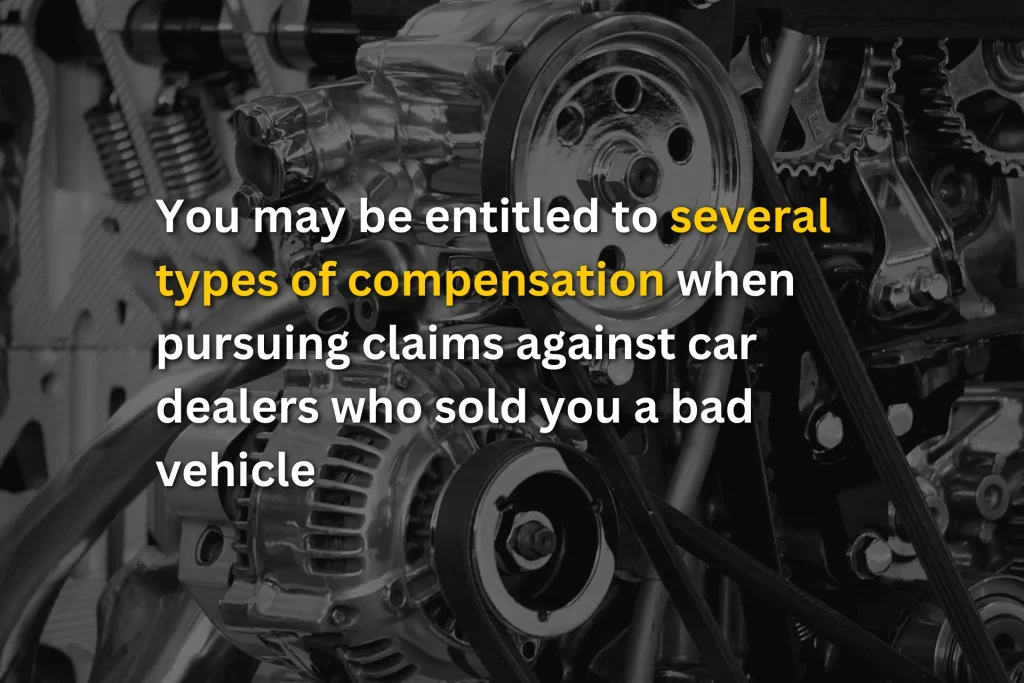
When pursuing claims against car dealers who sold you a bad vehicle, you may be entitled to several types of compensation.
Direct Damages
Common direct damages include:
- Full refund of the vehicle’s purchase price
- Cost of all repairs attempted
- Rental car expenses during repairs
- Towing fees
- Registration and licensing fees
- Finance charges paid on your car loan
Consequential Damages
These additional damages may include:
- Lost wages from missed work
- Alternative transportation costs
- Hotel stays if breakdown occurred while traveling
- Missed business opportunities
- Cost of mechanical inspections
- Legal fees and court costs
Punitive Damages
In cases of fraud or egregious misconduct, courts may award punitive damages. Examples of conduct that might warrant punitive damages:
- Knowingly selling vehicles with rolled-back odometers
- Concealing major accident damage
- Misrepresenting certified pre-owned status
- Forging documentation
- Deliberately hiding known serious defects
Get Help With Your Defective Vehicle Claim
Dealing with a bad car purchase can be incredibly frustrating and time-consuming. At Consumer Action Law Group, our attorneys specialize in helping consumers fight back against deceptive dealer practices and manufacturer defects. We understand the stress and disruption that a defective vehicle can cause in your life.
Our experienced lawyers work diligently to hold dealers accountable when they sell defective vehicles. We handle all aspects of your case, from gathering evidence to negotiating with dealers and manufacturers. Our goal is to get you the compensation you deserve while making the process as smooth as possible.
We offer free initial consultations to evaluate your case and explain your options. Our experienced lawyers can help you understand if your vehicle qualifies for legal action, what claims you may have, how much compensation you might recover, and how long the process might take. Every case is unique, and we provide personalized attention to ensure the best possible outcome for your situation.
Don’t continue struggling with a defective vehicle alone. Contact Consumer Action Law Group today at (818) 254-8413 to schedule your free consultation and learn how we can help you get justice. Our team is ready to fight for your rights and help you move forward from this challenging situation.












